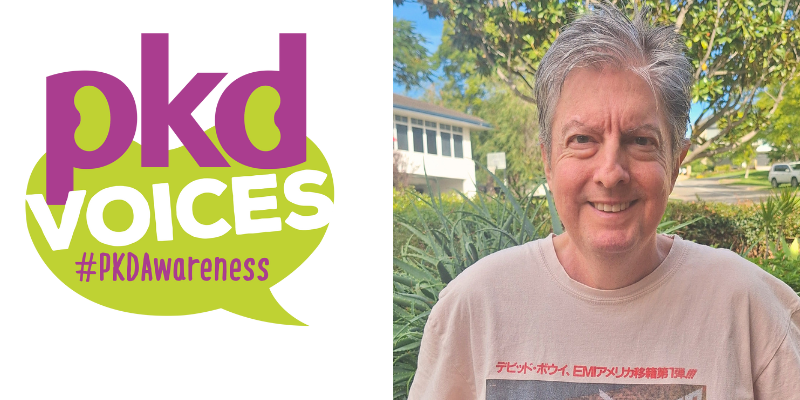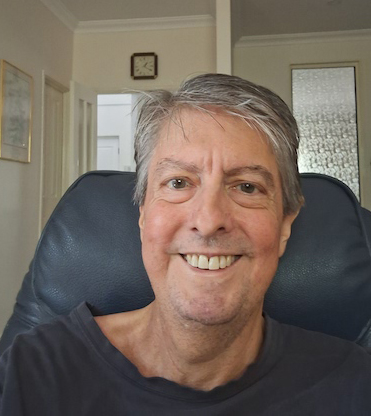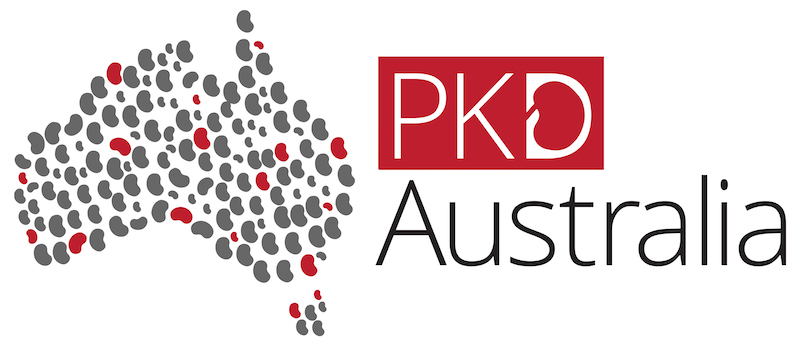
Shane's Story
Shane shares his journey from discovering he had PKD and fighting a disease he’d never heard of, to making the difficult decision to leave London and return home to Australia to be cared for by family as his condition worsened.
Tell us about where you grew up and where you are living now.
I grew up in Perth, where I currently am. But over the years I’ve lived in Germany (in a small town called Michelstadt im Odenwald) and in Dublin, Ireland. I’ve lived in London for over 20 years, and now call it home. I’m hoping to return there early next year. I work in Education, and have most recently helped to develop curriculum and assessments for UK-based professional bodies. I recently completed a Masters in Education at University College London.
When did you receive your PKD diagnosis?
I was diagnosed in 2013 while I was living in London. It was a surprise as I had never heard of PKD before, and I was a bit blasé about it (not appreciating the severity of it). It was hard to imagine how serious it could be. My kidney function was about 60-70% at that stage, so I didn’t notice any symptoms initially, and I was too busy with work at the time, to really reflect on it. It was only when I was referred to a nephrologist it finally sunk in that I was diagnosed with a chronic condition, and how it was likely to affect my life.
What led you to return to Australia?
My health condition and COVID-19 hitting in 2020 was the turning point. I had intended to see out my health journey in London (I’m a great fan of the NHS in the UK) and I was getting great treatment there. However, I was considered to be clinically extremely vulnerable because by then my kidney function was about 25-30%. I was told to “shield” and avoid contact with anyone. But I’m such a social person and used to travelling all the time. To be stuck in my little flat in central London for six months by myself… It was pretty hard. I was extremely lucky that I was able to get back to Western Australia, especially because of what I’ve been through since then – with renal failure, dialysis and a double liver and kidney transplant. I’m very grateful to have had my parents for support; I’m not sure how I would have managed by myself in London. Although, my intention is to return to London, and pick up where I left off, early next year, all things being equal.
Can you tell us more about your PKD treatment and symptoms?
I got to start Tolvaptan, I think in 2015, which was earlier than it was available in Australia. That was a bit of an adjustment, as you’re probably aware it requires you to drink an awful lot of water! I hadn’t yet declared my diagnosis to my employer at that stage, but when I did my boss was really cool about it. And you adapt quite quickly, so I would advise anyone eligible for Tolvaptan, to try it. You can always stop it. And I suppose I got increasingly more tired. I used to jog a lot. And I think it was frustrating because I got to the stage where I could only jog one or two hundred metres and be completely out of breath.
My condition gradually worsened, and my abdomen got larger and larger. In 2022, they decided to remove one of the kidneys because I was suffering a lot of abdominal pain and needed to make space – because I didn’t appear to have enough room for a transplanted kidney! So I had a pre-emptive nephrectomy, which put me into renal failure and that’s when I started dialysis and joined the kidney transplant waitlist. Six months later, I felt my stomach had gotten as big as before.
I went to my liver specialist and, it turns out, the liver had grown so large it had basically taken up all the space that had been vacated by the removed kidney! So the liver team spoke to the kidney team, and they recommended that I come off the kidney transplant waitlist, because they felt that it would be better if I got one double transplant. That was a bit of an anti-climax; by that stage I’d been on the kidney transplant waitlist for about a year. But in the end, I was very lucky because I was only on that list for about six months before I got a call in January 2024 for the double liver and kidney transplant.
How did you find out about PKD Australia?
I became aware that there was a PKD charity in the UK when I was first diagnosed. I rang the Information Line, and the CEO Tess Harris, who has sadly since passed away, answered, and she spent well over an hour speaking to me. Tess was so patient and caring, helping me navigate my condition. I also spoke to her when contemplating coming back to Australia, and she gave me confidence that Australia had a good health system and there was a similar charity called PKD Australia.
Why are you passionate about advocacy?
Raising awareness about PKD is crucial as many people are unaware of the disease. Increased awareness can lead to better support and resources for those affected. People are far more aware of other diseases like bowel cancer, or multiple sclerosis… but not PKD. I’d love to improve the awareness and knowledge of this condition.
What frustrates you most about living with a rare disease?
I had no idea what it was, and I wasn’t symptomatic except for having high blood pressure for years. But no one thought to check for any other underlying cause, for example, polycystic kidneys. However, I try not to get frustrated. I feel there’s no point in feeling sorry for yourself, so I try to make the most of it and remain upbeat. I find that work is a really good distraction!
You had your transplant 6 months ago. How are you feeling?
Post-transplant, it has mostly been smooth, but a few bumps in the road; including a 'sleepy kidney' (really anticlimactic to do dialysis after a transplant), some other low levels due to some of the meds; and currently there’s some BKV and CMV in my system (which the doctors are hoping they can suppress). But on the positive side, I haven’t felt this good in years. The transformation has been amazing. It’s only now I can reflect back, and realise really how unwell I was, and how the PKD (and PLD) affected me physically and mentally. I’m living life to the full now. I need less sleep, have so much energy, am back working full time, socialising, exercising, and making the most of this second lease of life.

On the road to recovery!
Is there a message you would like to share with the PKD community?
I’ve found PKD can be very isolating with the general lack of awareness of it, especially if it doesn’t run in your family. I have found comfort in connecting with others in a similar situation. Everyone’s journey will be different: it’s not a cut and paste situation. There are so many variables along the journey. But it is still useful to speak to others, not just one person. I’d also like to thank PKD Australia, PKD Charity UK and the work that they do. It’s really important. The newsletters, the webinars...etc. They help reduce the isolating feeling. Thank you.
Original article courtesy of Shane Balzan, and PKD Australia.

Stay up to date with PKD Charity events, patient stories and research news as it happens.
